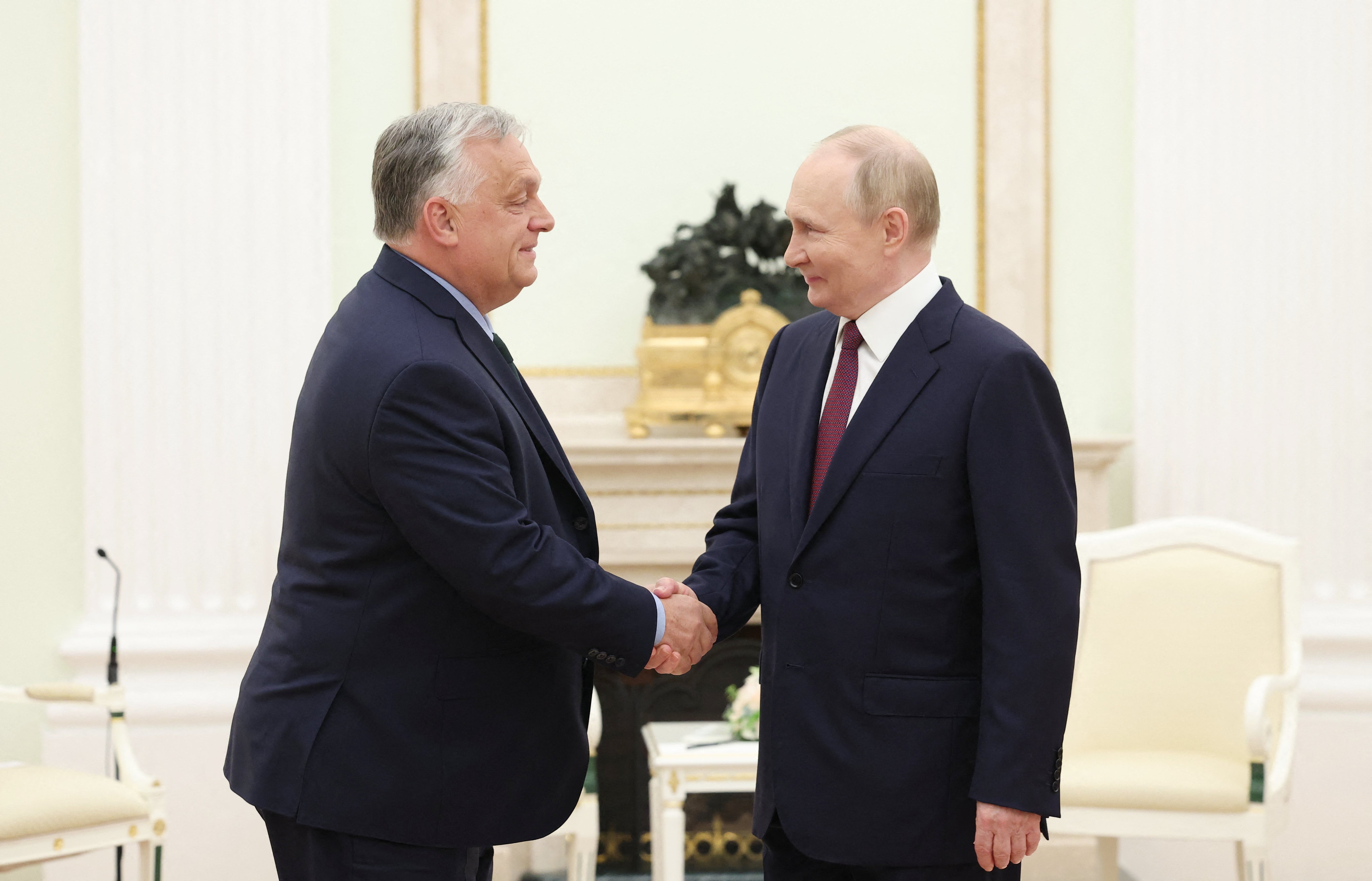Trump will push for Ukraine-Russia peace immediately if elected, Hungary’s Orban tells EU leaders
Hungarian prime minister calls for reopening direct lines of diplomatic communication with Russia in letter to his fellow leaders

Donald Trump will push for peace over Russia’s invasion of Ukraine “immediately” if he is elected for a second term in the White House, Hungarian prime minister Viktor Orban has claimed in a letter to European Union leaders.
The letter, addressed to European Council president Charles Michel and shared with all EU leaders, was written after Mr Orban held talks with the Republican presidential candidate, as well as with the leaders of Ukraine, Russia and China.
"I can ... surely state that shortly after his election victory, he will not wait until his inauguration, [Mr Trump] will be ready to act as a peace broker immediately. He has detailed and well-founded plans for this,” Mr Orban wrote.
He also suggested “reopening direct lines of diplomatic communication with Russia” while maintaining high-level contacts with Kyiv as well as conducting talks with China “on the modalities of the next peace conference”.
Mr Orban’s approach clashes with the conclusions of the last EU summit on 27 June, when leaders reconfirmed their unwavering commitment to provide continued political, financial, economic, humanitarian, military and diplomatic support to Ukraine and “as long as it takes and as intensely as needed”.
The letter represents a climactic end to Mr Orban’s controversial multiple-country tour in the first weeks of assuming the rotating six-month presidency of the bloc on 1 July.
During the visit to Kyiv, his first since the full-scale invasion began in February 2022, he urged Ukrainian president Volodymyr Zelensky to seek a ceasefire with Russia prior to expelling Moscow’s troops, which drew condemnation from other bloc members who suggested such a move was rewarding Kremlin aggression.

He then visited Vladimir Putin in Moscow and Xi Jinping in China as part of his self-styled “peace mission”, drawing further ire from other bloc members.
The letter comes less than a week after the pair met at Mr Trump’s Mar-a-Lago residence in Florida. The longtime allies have both been publicly sceptical about continued aid to Ukraine and the role of Nato in supporting Kyiv.
EU leaders denounced his actions, stressing Mr Orban had no mandate to speak on behalf of the 27-nation bloc and whatever views he presented were his own.
To underline the displeasure with Hungary’s rogue diplomacy on the war in Ukraine, which undermines long-held EU positions, the European Commission on Monday took the unprecedented step of barring EU commissioners from attending meetings held in Hungary under the country’s presidency.
Some EU governments also privately plan to send only top civil servants, rather than government ministers, to ministerial talks in Hungary and 63 European parliament lawmakers have asked the EU to withdraw Hungary’s voting rights in the bloc.
EU foreign policy chief Josep Borrell, meanwhile, will reportedly summon the ministers to a “formal” foreign affairs council at the same time as Mr Orban hosts his own summit in Budapest at the end of next month in a bid to avoid presenting any idea of support for the Hungarian leader’s recent comments.
Mr Orban has long criticised European military support for Ukraine, in contrast to most allies, who support Kyiv’s war effort.
The Hungarian leader said a Trump victory would change the burden between the United States and the EU when it comes to financial support for Ukraine, to the disadvantage of the Europeans.
“Our European strategy in the name of transatlantic unity has copied the pro-war policy of the US. We have not had a sovereign and independent European strategy or political action plan up to now,” he said.
“I propose discussing whether the continuation of this policy is rational in the future.”
In a sign of a further strengthening of ties between Mr Orban and Mr Trump, the Republican candidate elected Ohio senator JD Vance, a known admirer of the Hungarian prime minister, to be his running mate on Monday evening.
Earlier this year, Mr Vance voiced support for some of the policies of the nationalist government of Mr Orban, including legislation that set up foundations to take over the running of universities which some critics said could jeopardise academic freedoms.
Mr Orban’s political director Balazs Orban, no relation, congratulated Mr Vance on being chosen as a potential new vice president, saying the “Trump-Vance administration sounds just right”.
Join our commenting forum
Join thought-provoking conversations, follow other Independent readers and see their replies
Comments


Bookmark popover
Removed from bookmarks